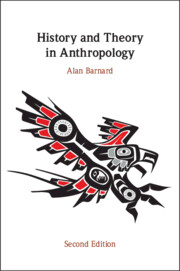Book contents
- History and Theory in Anthropology
- History and Theory in Anthropology
- Copyright page
- Dedication
- Contents
- Figures
- Tables
- Preface
- 1 Visions of Anthropology
- 2 Precursors of the Anthropological Tradition
- 3 Changing Perspectives on Evolution
- 4 Diffusionist and Culture-Area Theories
- 5 Functionalism and Structural-Functionalism
- 6 Action and Process
- 7 Marxist Perspectives
- 8 From Relativism to Cognitive Science
- 9 Structuralism, from Linguistics to Anthropology
- 10 Poststructuralists and Feminists
- 11 Mavericks
- 12 Interpretive Approaches
- 13 Postmodernism and Its Aftermath
- 14 Conclusions
- Book part
- References
- Index
13 - Postmodernism and Its Aftermath
Published online by Cambridge University Press: 09 December 2021
- History and Theory in Anthropology
- History and Theory in Anthropology
- Copyright page
- Dedication
- Contents
- Figures
- Tables
- Preface
- 1 Visions of Anthropology
- 2 Precursors of the Anthropological Tradition
- 3 Changing Perspectives on Evolution
- 4 Diffusionist and Culture-Area Theories
- 5 Functionalism and Structural-Functionalism
- 6 Action and Process
- 7 Marxist Perspectives
- 8 From Relativism to Cognitive Science
- 9 Structuralism, from Linguistics to Anthropology
- 10 Poststructuralists and Feminists
- 11 Mavericks
- 12 Interpretive Approaches
- 13 Postmodernism and Its Aftermath
- 14 Conclusions
- Book part
- References
- Index
Summary
Postmodernism came to the fore towards the end of the twentieth century. A key dynamic too was globalization. As the world became smaller, its global scope became more apparent and with it the idea of indigeneity – of being indigenous to some part of it. Following the rise of globalization, in a way, its antithesis became apparent, and this sparked a renewed interest in nationalism.
Information
- Type
- Chapter
- Information
- History and Theory in Anthropology , pp. 174 - 189Publisher: Cambridge University PressPrint publication year: 2021
